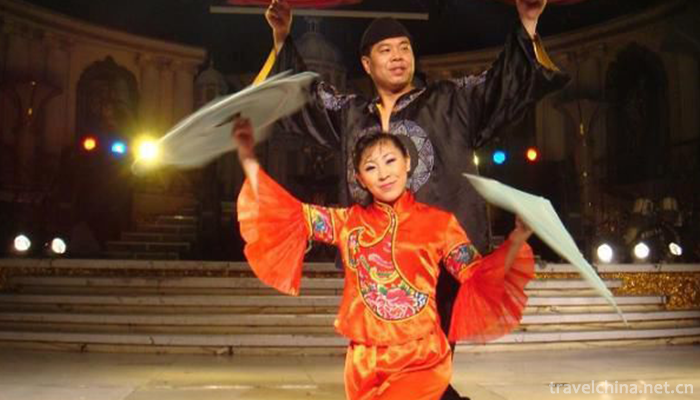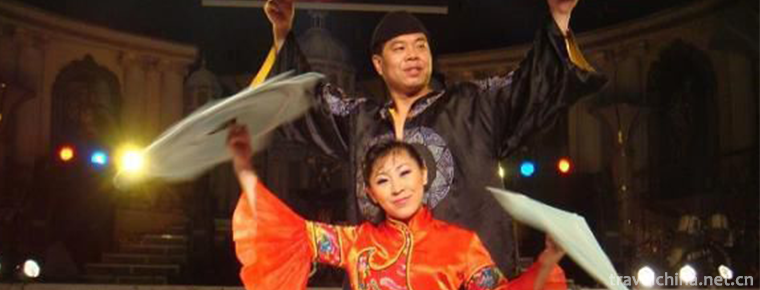Duet in Northeast China Errenzhuan
Duet in Northeast China Errenzhuan
Errenzhuan, historically known as small Yangko, double play, bouncing, also known as the mouth, double side songs, Fengliu, Spring Song, half-class opera, Northeast local opera, etc. It is a unique folk art form with a history of more than 300 years and a long tradition of primitive culture.
It is rooted in the folk culture of Northeast China and belongs to the folk art of Chinese walking singing. It is popular in Liaoning, Jilin, Heilongjiang, Inner Mongolia, Eastern Three Municipalities, One League and Northeast Hebei Province. The form of expression is a man and a woman, with bright clothes, fans and handkerchiefs in hand, singing and dancing while walking, showing a story, singing high-pitched, rough and witty lyrics.
The Northeast characteristic duet mainly comes from the Northeast Yangge and the lotus flower fall of Hebei Province. In Northeastern witty words, the duet is "Yangko bottom, lotus flower edge". On the basis of the Northeast Yangko, Erren Duet absorbed the lotus falls of Hebei Province, and added dancing, stature, walking and so on. Since its founding, the duet has a history of nearly 300 years. The relationship between artists and teachers can be traced back to the end of Jiaqing in the Qing Dynasty. In history, the duet has formed four schools: east, west, South and north. In the late Qing Dynasty and the early years of the Republic of China, the tide of "breaking through the east of Guan" appeared. A large number of Shandong and Hebei people entered the northeast. The two people of "Yangko bottom, lotus flower edge" turned to "breaking through the east of Guan" from inside and outside Guan to outside Guan.
The two renamed sections include "Big West Chamber", "Hui Cup Ji", "Zhu Jiu Hong Hang Xiao", "Liang Saijin Rolling Face", "Water Splashing in front of Horse", "Empress Dowager Bao Gong Ju" and so on. In 2006, the Northeast Duet Duet was listed in the first national intangible cultural heritage list by the State Council.
Development situation
Errenzhuan is rooted in the Northeastern folk culture, so its performance lines have some rural characteristics, vulgar acid, but the content of Errenzhuan is not mainly vulgar acid, many of the opera lyrics of Errenzhuan are connected with "opera review", "northeastern drum" and "lotus flower fall". This phenomenon lasted until the establishment of Jilin Folk Art Troupe in 1980. Its predecessor was Jilin Jilin Opera Troupe No. 2.
After the revision of Jilin Folk Art Troupe, a lot of arias have become well-known arias of Errendou. For example, "pig eight arches", "back to the cup", "horse before water", "west view painting", "scolding duck", "Liang Zhu downhill", "Bao Gong broken empress dowager", "water overflowing blue bridge", "two mothers visit sick", "Sun Wukong three tune banana leaf fan", "drunk sky" and so on. While adapting a large number of traditional dramas, Jilin Folk Art Troupe has also trained a large number of duet performers. Clown actors include Han Ziping, Qin Zhiping, Dong Lianhai, Xu Zhenwu, Yin Weimin and so on. Danjiao actors include Zheng Shuyun, Dong Wei, Li Xiaoxia, Guan Changrong, Yan Shuping, Yang Hongwei, Sun Xiaoli, and so on.
The name of the duet was first found in the seventh edition of Taidong Daily, April 27, 1934, in Kant, Manchuria. A teahouse on Sandao Street in this city (A Cheng) has never seen a couple of people invited by a village to perform the two-person duet. They are called "Lotus Flower". They dress up all kinds of roles and perform songs everyday.
In April 1953, at the first National Folk Music and Dance Congress held in Beijing, the Northeast delegation officially participated in the performance of the duet, thus the name of duet was recognized for the first time by the national literary and artistic circles.
The history of Er Ren Zhuan is a history that absorbs the essence of all kinds of art. Errenzhuan opera song is the combination of Errenzhuan melody and contemporary popular elements. It integrates the skills of opera singing with strong national characteristics and popular songs with distinct fashion elements. Because opera song sounds like both opera and song, it can not only be accepted by the old and middle-aged audience with nostalgia, but also be loved by young people.
In recent years, there have been many popular opera songs about two people's performance, among which the most representative is Yan Xuejing's series of songs, which can be roughly divided into four categories: classical works such as Blue River Complaint, West Chamber Story, Hui Cup Story, Sending Lover, etc., which eulogize romantic love, Jijie Song reflecting national culture and regional customs, Yan Ge, Watching Yangko, White Snow Flower, Guandong Love and Going Home. 》 "Home" and "Please come to Jilin" and other songs; reflecting the lives of the people, "things of the people are greater than heaven", "fight is kiss to scold is love", "county magistrate goes to the countryside to our home" and other songs; with the theme of the art itself, "Guandong Renren and RenRenren Renren", "Ningshe a meal, not give up Renren ren" and other songs.
The last kind of song has its own characteristics, which not only reflects the people's love for the duet, but also points out the main features and contents of the duet art. Similarly, Liu Hegang's "Northeast Errenren Roll", Yan Shuping's "I'm a Duet Roll", Pan Changjiang's "Northeast Erren Roll", Chai Baoyu's "Wind, Fire and Wind Erren Roll", Sun Xiaobao and Jinling's "Love Erren Roll", Xiaoshenyang and Shenchunyang's "Duet Roll of Two People". These songs also contribute to the spread and development of Errendou.


-
1.Pingyao Ancient City Scenic Spot
Pingyao Ancient City is located in Pingyao County, central Shanxi Province. It was founded in Xuanwang Period of Western Zhou Dynasty (827-782 BC).
Time 2019-02-07 -
2.Shenyang Science Centrum
Shenyang Science Palace is located in Wulihe Central Business District, Shenyang District, Liaoning Province. It is a large-scale modern popular science education base in Shenyang District. It was bui
Time 2019-02-08 -
3.Weishan Lake National Wetland Park
Weishan Lake National Wetland Park, located in the southern part of Weishan County, Jining City, Shandong Province, is less than 3 kilometers away from the urban area.
Time 2019-02-22 -
4.Buddhist music
Buddhist music, the music used by Chinese Buddhist temples and believers in religious ceremonies. Buddhism believes that music has the function of "offering" and "praising Buddha".
Time 2019-04-29 -
5.Stories of Marine Animals
Marine animal stories are mainly handed down orally. The traditional folklore stories circulated in the islands for a long time have been formed and disseminated in Dongtou
Time 2019-05-02 -
6.Legend of Hetuluo Books
The legend of Hetu Luoshu is a folklore system about Hetu and Luoshu, which was born in Luoyang, Henan Province. It mainly includes the legend of Longma Negative Tu Temple and the offering of Luoshu b
Time 2019-05-03 -
7.Puppet Head Sculpture
Zhangzhou puppet head carving is a traditional folk arts and crafts in Zhangzhou City, Fujian Province. It belongs to a special skill in the production of puppet stage props. Zhangzhou puppet head car
Time 2019-06-06 -
8.Performing and Making Skills of Qiang Flute
Qiang flute is an ancient single-reed gas singing instrument in China. It has a history of more than 2000 years. It is popular in the Qiang people's residence of Aba Tibetan Autonomous
Time 2019-06-10 -
9.Three stick drum
Sanwanggu is a kind of folk singing form widely spread in Youyang of Chongqing, Yongshun County of Longshan County in Western Hunan, Zhangjiajie and Wuyang, Tianmen and Enshi Prefecture in southwester
Time 2019-06-12 -
10.Huainan Normal University
The school was founded in 1958 when it was a teacher's College in Huainan. In 2000, approved by the Ministry of education, the former Huainan normal school, Huainan Education Institute and Huainan nor
Time 2019-11-16 -
11.Transportation in Panzhihua
By the end of 2018, Panzhihua had 3733.91 kilometers of grade roads and 195 kilometers of expressways. In the whole year, the highway passenger traffic volume was 20.79 million person times, the passenger turnover volume was 597.18 million person kilometers,
Time 2020-12-14 -
12.Guangan scenic spot
By 2018, there are 24 A-level scenic spots in Guang'an City, of which Deng Xiaoping's hometown is a national 5A scenic spot, and six scenic spots, including Huaying Mountain tourist area, Shenlong mountain Ba Ren stone city, baozhensai, Tianyi Vall
Time 2020-12-19